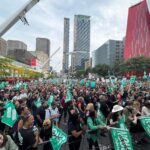Discusses the civilians suffering from the sanctions on Iran. Originally appeared in London Progressive Journal on September 22, 2019 here.
When asked about the deaths of over half a million Iraqi children on account of UN sanctions, Madeline Albright famously said: “This is a very hard choice, but we think the price is worth it.” US authorities deny that the current sanctions imposed by American authorities against Iran, and coordinated to a large extent with a number of other countries, block essential goods, such as food and medicine. The aim here it to show that this denial is wrong.
In spite of the exemption of food and medicines, the restrictions applied to the banking system have already made transactions for the import of such products next to impossible.
But a fear of the consequences from the sanctions indirectly related to the officially sanctioned products has recently turned out to be especially remarkable. This is the case, for instance, when a third country provides a vessel carrying Iranian goods with fuel for its voyage. This is what happened to several Iranian vessels, including Bavand and Termeh. These two came to Brazil a couple of months ago carrying urea and expected to go back to Iran with corn! Without fuel, they have been stranded since then. Neither of these products are officially sanctioned.
The result is a tragic increase in the number of people like the woman in the picture above. Nasrin, a 60 year old woman, suffers from diabetes. Such individuals must regularly measure their blood sugar. To do this, they need a machine. The tapes used in such machines are unique: if you buy a machine and can’t find its tape you will have to buy a second one and then the third one, and so on. This is the case with Nasrin. Although a single mother of a large family, she happens to be able to afford to buy the third one. Nonetheless, there are many who cannot.



0 Comments